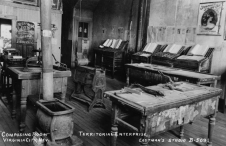Alice Key: A Renaissance Woman
Dancer, journalist, community activist, and political leader, Alice Key made many contributions to Las Vegas and civil rights.
Born on March 18, 1911 in Henderson, Kentucky, she moved as an infant to Riverside, California, with her entire family. She grew up across the street from her grandfather, who instilled a fierce Black pride in her. On the day of her high school graduation in 1928, she left to join her mother, who had taken a position in Los Angeles a few months earlier.
Key entered UCLA to study journalism, but the city was too exciting to keep her in school. Her mother worked at the Club Alabam on Central Avenue, where Alice met a young woman who persuaded her to dance. Leroy Broomfield, a show producer at Frank Sebastian's famed Cotton Club in Culver City, talked her mother into letting Alice become a dancer. Never a great dancer, Key felt she was a good chorus girl because she could remember the routines, worked hard, was always on time, and looked the part.
Dancing was the vehicle that propelled Alice into political activism, germinating the seed her grandfather planted. When Alice learned that dancers were paid according to the rating assigned to each club, and that the Cotton Club was a "B" while similar clubs with white dancers were rated "A," she rallied her fellow dancers and protested to the union. After winning that fight, she took the line over to Central Avenue, the hub of the Black community, and picketed a drug store that refused to hire Blacks.
Los Angeles also fueled her desire for other newly found talents. Hollywood producers would come into the Cotton Club and offer the girls work in films, usually in nightclub scenes. Additionally, big bands played there, so Alice got to know both Louis Armstrong and Duke Ellington. After she had danced for five years, it was Ellington who recommended her as a dancer at the Cotton Club in Harlem. That led to a six-month stint at the Moulin Rouge in Paris and the Palladium in London, touring with the Cotton Club show.
Alice retired from show business in 1943 and began her second career, journalism, by writing for a Black newspaper, The Los Angeles Tribune. One of her memorable scoops was the discovery, made during a visit to Fort Huachuca in Arizona, that the blood plasma of Black soldiers was indeed separated from that of whites.
Her next newspaper assignment, in 1954, moved her to Las Vegas to work for the Las Vegas Voice, owned by a long-time acquaintance, Dr. Charles I. West. Simultaneously, she started the first Black television show, Talk of the Town, which aired on Channel 8, KLAS. That show, produced and directed by Bob Bailey, may have been the first Black show in the nation.
In the late 1960s, Alice embarked upon her third career, public service. She spent several years as executive director of the local NAACP, as well as with the Clark County Economic Opportunity Board; she spent a memorable year working with the Nevada Committee for the Rights of Women, which educated women about birth control and fought for abortion law reform in Nevada; and she spent a decade as deputy labor commissioner for the State of Nevada. Governor Richard Bryan appointed her to the position in 1983, which entailed responsibility for Southern Nevada. When complaints were filed with the Labor Commission, Key's office investigated the validity of those accusations in Clark, Lincoln, and Nye counties.
After three dynamic careers, Key retired in 1993 at age eighty-two. But her unpaid work over the years was probably even more impressive than the positions that provided her livelihood. Her political activism that was born from her early days in Los Angeles never waned. In Nevada, she worked on the campaigns of Governors Bryan and Grant Sawyer, and U. S. Senator Harry Reid. In both Los Angeles and Las Vegas, she registered massive numbers of people to vote. She carried a folding table, a chair, and a stack of registration forms in her car trunk and would stop in areas where groups gathered and set up shop. On election day, she joined like-minded activists to arrange transportation to the polls.
Key participated in founding two organizations, The Barbara Jordan Democratic Club, intended to increase political awareness, and Ladies Who Danced, to provide funds for worthy cultural causes. The Democratic Club was a disappointment, never living up to the great expectations of providing seminars and workshops to elevate the political consciousness of young people in the Black community.
At age ninety-five, Key gathered members for a Black Las Vegas Historical Society, Inc., hoping to collect the history of the Black experience in Las Vegas. She was inducted into KLAS, Channel 8's Wall of Fame on July 20, 2005.
Alice Key passed away on September 29, 2010. She is survived by her one daughter, Alice McAbee, two grandsons, and several great-grandchildren.
Article Locations
Related Articles
Further Reading
None at this time.
